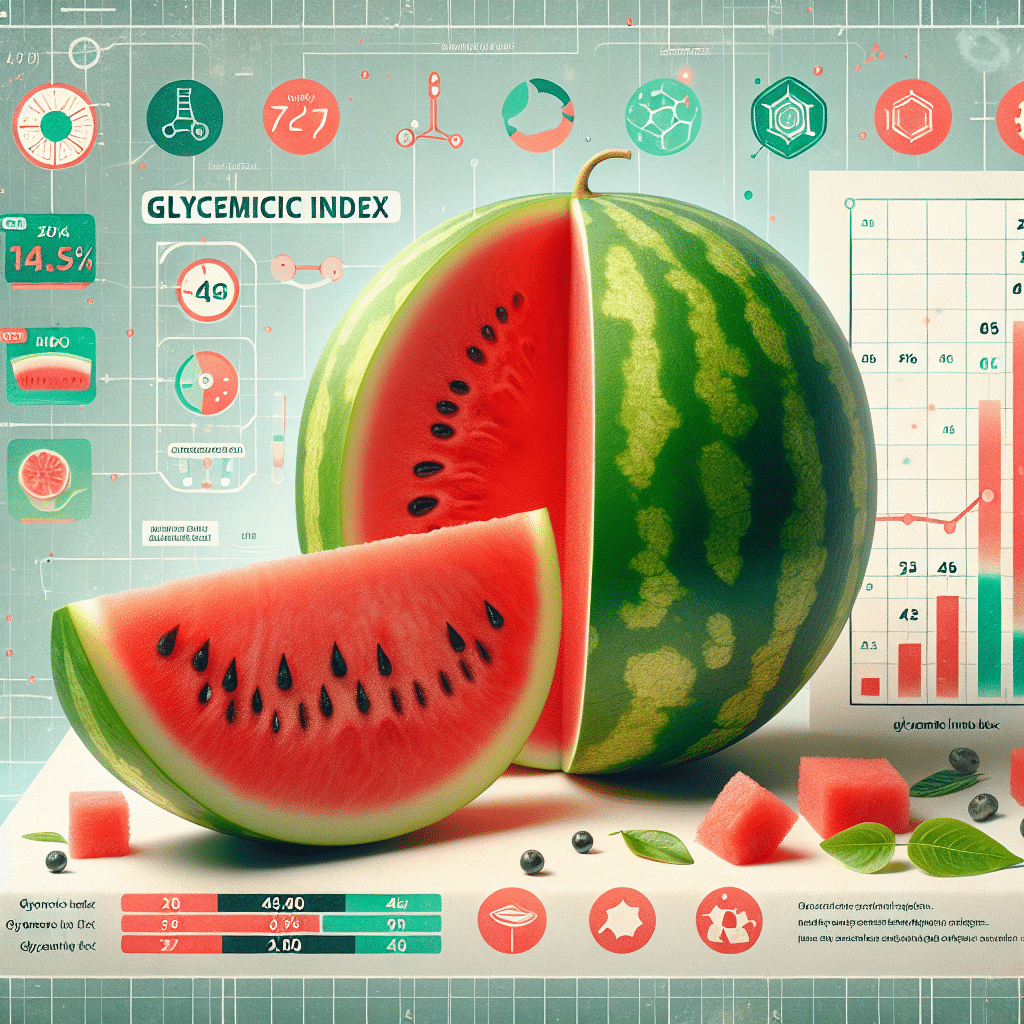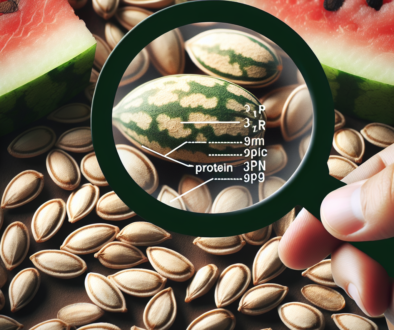Watermelon Glycemic Index: Sweetness Without the Spike
-
Table of Contents
- Watermelon Glycemic Index: Sweetness Without the Spike
- Understanding the Glycemic Index
- Watermelon’s Glycemic Index
- Nutritional Benefits of Watermelon
- Incorporating Watermelon into a Balanced Diet
- Case Studies and Research
- Conclusion: The Sweet Balance
- Discover ETprotein’s Plant-Based Protein Products
Watermelon Glycemic Index: Sweetness Without the Spike

Watermelon is a refreshing and hydrating fruit that’s synonymous with summer picnics and beach outings. Its sweet, juicy taste makes it a favorite among people of all ages. However, for those monitoring their blood sugar levels, the sweetness of watermelon can raise concerns about its impact on their glycemic response. In this article, we’ll explore the glycemic index (GI) of watermelon and how it can be a sweet treat that doesn’t necessarily lead to a spike in blood sugar levels.
Understanding the Glycemic Index
The glycemic index is a ranking system for carbohydrates based on their immediate effect on blood glucose (blood sugar) levels. Carbohydrates that break down quickly during digestion and release glucose rapidly into the bloodstream have a high GI; those that break down more slowly, releasing glucose more gradually into the bloodstream, have a low GI. Here’s a quick reference for GI values:
- Low GI: 55 or less
- Medium GI: 56-69
- High GI: 70 or above
Understanding the GI of foods can be particularly beneficial for individuals with diabetes, as it helps them predict how their blood sugar might respond to different foods.
Watermelon’s Glycemic Index
Despite its sweet taste, watermelon has a glycemic index of around 76, which classifies it as having a high GI. However, this number doesn’t tell the whole story. The glycemic load (GL) is another important factor to consider. GL takes into account the amount of carbohydrate in a serving of food as well as its GI. Watermelon has a low glycemic load because it contains a high percentage of water and a relatively small amount of carbohydrates.
- Low GL: 10 or less
- Medium GL: 11-19
- High GL: 20 or above
With a GL of 5 for a standard serving (120 grams), watermelon can be enjoyed without significantly impacting blood sugar levels for most people.
Nutritional Benefits of Watermelon
Watermelon isn’t just a low-calorie, hydrating fruit; it’s also packed with vitamins, minerals, and antioxidants. Here are some of the nutritional highlights:
- Rich in Vitamin C and Vitamin A
- Contains the antioxidant lycopene, which has been linked to heart health and cancer prevention
- Provides potassium, which is important for blood pressure control and heart health
- Contains amino acids like citrulline, which may help improve athletic performance
These nutritional benefits make watermelon a healthy addition to any diet, especially for those looking to enjoy sweet flavors without compromising their health goals.
Incorporating Watermelon into a Balanced Diet
While watermelon has a high GI, its low glycemic load means it can be included in a balanced diet without causing significant blood sugar spikes. Here are some tips for enjoying watermelon:
- Pair it with foods that have protein or healthy fats to further stabilize blood sugar levels.
- Consume watermelon in moderation, keeping portion sizes reasonable.
- Enjoy watermelon as part of a meal rather than on its own to minimize its impact on blood sugar.
By following these guidelines, individuals with concerns about blood sugar can still savor the sweetness of watermelon.
Case Studies and Research
Several studies have investigated the effects of low GI diets on health. For instance, a study published in the “American Journal of Clinical Nutrition” found that a low GI diet may improve glycemic control in individuals with type 2 diabetes. While watermelon itself has a high GI, its low GL means it can fit into a low GI diet when consumed appropriately.
Another study in the “Journal of Nutrition” suggested that the consumption of low GI foods could reduce the risk of chronic diseases. Watermelon, with its wealth of nutrients and low GL, can be part of a dietary pattern that supports long-term health.
Conclusion: The Sweet Balance
Watermelon’s high glycemic index might initially seem alarming, but its low glycemic load offers a sweet reprieve for those concerned about blood sugar levels. By understanding the difference between GI and GL and how to incorporate watermelon into a balanced diet, individuals can enjoy this delicious fruit without the worry of a sugar spike. The key is to consume it in moderation and as part of a meal that includes proteins and fats to help stabilize blood sugar levels.
The nutritional benefits of watermelon, including its vitamins, minerals, and antioxidants, make it a valuable addition to any diet. So go ahead and enjoy a slice of watermelon sweetness without the spike!
Discover ETprotein’s Plant-Based Protein Products
If you’re looking to complement your healthy diet with high-quality protein, consider ETprotein’s range of plant-based protein products. Their watermelon seed protein is an excellent choice for those seeking a vegan protein option that’s both nutritious and environmentally friendly. ETprotein’s products are non-GMO, allergen-free, and have a neutral taste, making them a versatile addition to any meal or snack.
Whether you’re involved in sports nutrition, weight management, or simply looking for dietary supplements to support your health and wellness, ETprotein has a protein solution for you. Their commitment to quality and customer satisfaction makes them a trusted supplier for consumers around the world.
For more information or to sample their products, please contact ETprotein and email sales(at)ETprotein.com today.
About ETprotein:
ETprotein, a reputable watermelon seed protein Chinese factory manufacturer and supplier, is renowned for producing, stocking, exporting, and delivering the highest quality organic bulk vegan protein and plant proteins. They include Organic rice protein, clear rice protein, pea protein, clear pea protein, watermelon seed protein, pumpkin seed protein, sunflower seed protein, mung bean protein, peanut protein etc. Their offerings, characterized by a neutral taste, non-GMO, allergen-free attributes, cater to a diverse range of industries. They serve nutraceutical, pharmaceutical, cosmeceutical, veterinary, as well as food and beverage finished product distributors, traders, and manufacturers across Europe, USA, Canada, Australia, Thailand, Japan, Korea, Brazil, and Chile, among others.
ETprotein specialization includes exporting and delivering tailor-made protein powder and finished nutritional supplements. Their extensive product range covers sectors like Food and Beverage, Sports Nutrition, Weight Management, Dietary Supplements, Health and Wellness Products, and Infant Formula, ensuring comprehensive solutions to meet all your protein needs.
As a trusted company by leading global food and beverage brands and Fortune 500 companies, ETprotein reinforces China’s reputation in the global arena. For more information or to sample their products, please contact them and email sales(at)ETprotein.com today.












